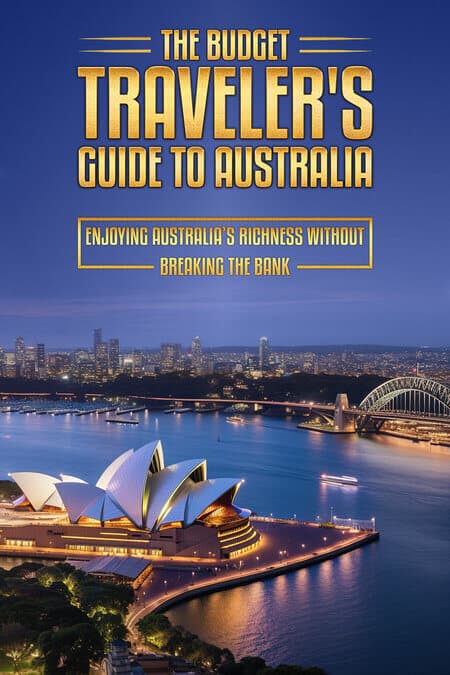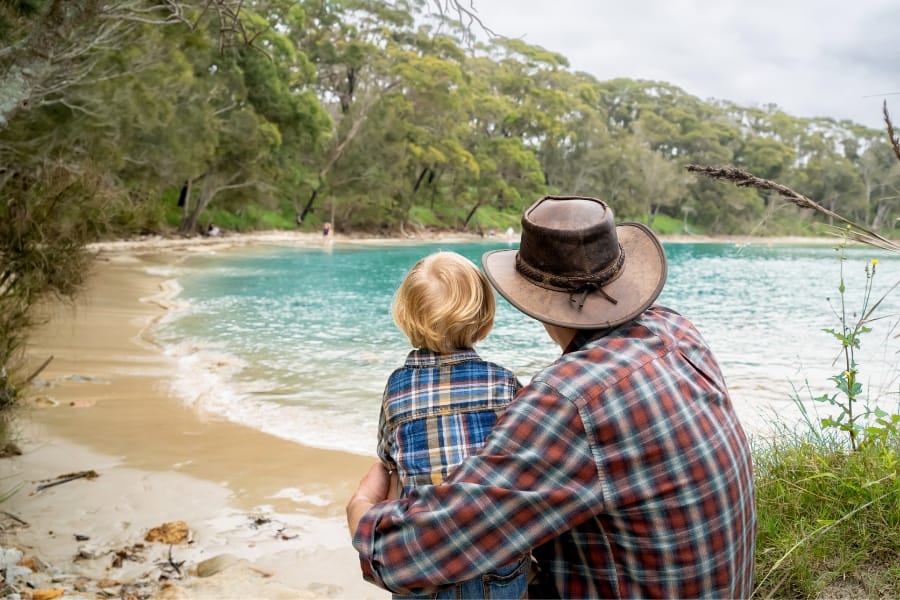Australia Travel Guide
Written by Joeri Van Overloop
Why Visit Australia?
Australia has long been a popular destination for travelers from all over the world. With its diverse landscape, vibrant culture and unique wildlife, Australia offers an unforgettable travel experience. This Australian travel guide will provide you with the information needed to plan your perfect trip to this breathtaking country. From exploring the lush forests of Tasmania to seeing the iconic Sydney Opera House, there are so many amazing things to do in Australia.
Natural beauty: Australia is home to stunning landscapes, including the Great Barrier Reef, the Outback, and beautiful Australian beaches.
Wildlife: Australia is known for its unique and diverse wildlife, including kangaroos, koalas, and wallabies.
Adventure: From surfing and scuba diving to hiking and bungee jumping, there are plenty of opportunities for adventure in Australia.
Food and wine: Australia has a thriving food and wine culture, with a range of local and international cuisines available.
Cultural experiences: From Indigenous culture to colonial history, Australia has a rich cultural heritage to explore.
Friendly locals: Australians are known for being friendly and welcoming, making it easy to feel at home in this beautiful country.
Great weather: With a warm climate and plenty of sunshine, Australia is a great destination for a holiday.
Affordable: Despite its many attractions and high standard of living, Australia is an affordable destination for travelers, with a strong currency and competitive prices.
In conclusion, Australia is a truly unique and exciting destination that has a lot to offer. With its natural beauty, diverse wildlife, adventure opportunities, rich cultural heritage, friendly locals, great weather, and affordable prices, it's no wonder that Australia is one of the most popular tourist destinations in the world. Whether you're looking for a relaxing beach holiday, an action-packed adventure, or a cultural exploration, Australia is sure to deliver an unforgettable experience.

The Budget Traveler's Guide to Australia
Don't let expensive travel costs hold you back from exploring the beauty of Australia. With "The Budget Traveler's Guide to Australia," you'll discover insider tips and tricks to help you save money while experiencing the best Australia has to offer. Start planning your affordable Australian adventure today and make unforgettable memories without breaking the bank.
Frequently Asked Questions When Travelling To Australia
What Is A Good Budget For A Trip To Australia?
The budget for a trip to Australia will vary depending on a number of factors, including the length of your stay, your travel style, and the specific activities you have planned. However, as a rough estimate, you can expect to spend anywhere from $50 to $150 per day, with an average budget for a two-week trip ranging from $1,400 to $4,200. This budget would cover accommodation, transportation, food, and some entertainment, but not including international flights.
Accommodation: The cost of accommodation in Australia varies depending on the location, type of accommodation, and time of year.
Budget options, such as hostels and budget hotels, start from around $20 to $30 per night. Mid-range options, such as three-star hotels or serviced apartments, can cost anywhere from $100 to $200 per night. Luxury hotels and resorts in major Australian cities can cost upwards of $300 per night.
Food and drink: On the lower end, fast food meals can cost around $10, while a more casual dining experience at a café or a pub can range from $15 to $30 per meal. At mid-range restaurants, you can expect to pay around $30 to $50 per meal, and at fine-dining restaurants, the cost can easily exceed $100 per person in Australia.
Transportation: The cost of transportation in Australia varies depending on the type of transportation and the distance traveled.
- By train: Train travel in Australia can range from around $15 to $100 per one-way trip, depending on the distance and the class of service.
- By bus: Bus travel in Australia can range from around $10 to $100 per one-way trip, depending on the distance and the level of comfort.
- By car rental: Car rental in Australia can cost anywhere from around $30 to $100 per day, depending on the type of vehicle and rental company.
- By taxi/ride-hailing: Taxi and ride-hailing services such as Uber and Ola can range from around $10 to $50 for a one-way trip within a city, depending on the distance and the time of day.
- By plane: Domestic flights within Australia can range from around $50 to $300 per one-way trip, depending on the distance, airline, and time of booking.
Activities and Excursions: Popular activities such as visiting Australian national parks and scenic lookouts, taking scenic flights, and going snorkeling or scuba diving can range from around $50 to $200 per person. Adventure activities such as skydiving, bungee jumping, and white-water rafting can cost anywhere from $100 to $500 per person.
Visiting cultural attractions such as museums, galleries, and historic sites can range from around $10 to $30 per person, while attending sporting events or concerts can cost anywhere from $20 to $200 per ticket.
Touring the Great Barrier Reef, one of Australia's most famous attractions, can range from around $100 to $500 per person, depending on the length and type of tour.
It is important to keep in mind that this is a rough estimate and your actual budget may vary depending on the time of year and your travel style.
How Many Days In Australia Is Enough?
For a brief overview of the country, a week to ten days can provide a good taste of the major cities like Sydney and some of the natural attractions, such as the Great Barrier Reef, the Sydney Opera House, and Uluru.
If you want to see more of the country and experience its diverse landscapes, a two- to three-week trip would allow you to visit several states and territories, including the tropical north, the Outback, and the coastal regions.
For a more comprehensive and in-depth experience, a month or longer would allow you to visit remote areas, go on extended hikes, and spend time getting to know local communities and cultures.
Ultimately, the right amount of time to spend in Australia depends on your personal interests and budget.
What Is The Best Way To Tour Australia?

The best way to travel Australia depends on your personal preferences and travel style. Here are a few popular options:
- Road trip: Renting a car or campervan and exploring Australia's vast and diverse landscapes is a popular and flexible option, allowing you to see the country at your own pace and stop whenever you like.
- Guided tour: Taking a guided tour can provide a more structured and hassle-free way to see the country, with everything from transportation to accommodation and activities arranged for you.
- Public transportation: Exploring Australia using public transportation, including trains and buses, is an affordable option for those who prefer a more sustainable and budget-friendly way to travel.
- Fly-drive: Combining flights with car rentals is a good option for those who want to cover a lot of ground quickly and see multiple destinations in a short amount of time.
What Is The Best Time To Visit Australia?
The best time of year to visit Australia depends on what you hope to see and experience during your trip.
Summer (December to February): Summer is the peak travel season in Australia, with warm weather and long days that are ideal for outdoor activities and beach vacations. This is a great time to visit the northern parts of the country, such as the Great Barrier Reef and the tropical rainforests of Queensland.
Autumn (March to May): Autumn is a shoulder season in Australia, with mild weather and fewer crowds, making it a good time to explore cities and cultural attractions. This is also a good time to visit the wine regions of South Australia and Victoria.
Winter (June to August): Winter is the off-season in Australia, with cooler weather and fewer tourists. This is a great time to visit the southern parts of the country, such as Tasmania, for outdoor activities and scenic drives.
Spring (September to November): Spring is a transitional season in Australia, with mild weather and blooming wildflowers, making it a great time to visit the Outback and the national parks.
It's worth noting that different regions of Australia have different climates and weather patterns, so it's important to research the specific area you plan to visit and choose the time of year that's best for your travel plans.
What Are The Dos And Don’ts In Australia?

Here are some dos and don'ts to keep in mind when visiting Australia:
Dos:
Respect local customs and traditions, such as taking off your shoes when entering someone's home.
Be environmentally conscious and follow local regulations, such as not littering or harming wildlife.
Be polite and courteous, especially when dealing with service providers and locals.
Try local cuisine and drinks, such as seafood, barbecued meat, and Australian wine.
Respect wildlife and give them space, especially when visiting national parks and wildlife reserves.
Don'ts:
Don't litter or damage the environment, as fines can be hefty and the local flora and fauna are protected.
Don't import or bring prohibited items into the country, such as certain fruits, plants, and animal products.
Don't drink and drive, as the legal blood alcohol limit is very low and strict penalties apply.
Don't be disrespectful to Indigenous Australians and their culture, such as taking photographs without permission or walking on sacred sites.
Don't engage in illegal activities, such as drug use or theft, as the penalties can be severe.
By following these guidelines, you can help ensure a safe, enjoyable, and culturally sensitive trip to Australia.
What Are The Visa Requirements For Australia?
The visa requirements for Australia depend on the individual's country of origin, length of stay, and purpose of visit. Here are a few common types of visas:
- Electronic Travel Authority (ETA): An ETA is a short-term visa that allows travelers from certain countries to visit Australia for up to three months for tourism or business purposes. This visa is obtained electronically and does not require a physical visa label in your passport.
- Tourist Visa: A Tourist Visa allows travelers to visit Australia for up to 12 months for tourism or business purposes. This visa is ideal for those who want to stay in Australia for an extended period or take part in longer-term travel or study.
- Working Holiday Visa: A Working Holiday Visa allows travelers from certain countries to work and travel in Australia for up to 12 months. This visa is ideal for those who want to work and live in Australia for a year, but only for a limited period of time.
- Student Visa: A Student Visa allows international students to study in Australia for an extended period of time, usually for the duration of their course.
It's important to note that visa requirements are subject to change and it's best to check the official Australian Government website for the most up-to-date information and to ensure that you have the correct visa for your planned activities in Australia.
Do I need Travel Insurance To Visit Australia?
It is not a legal requirement to have travel insurance when visiting Australia, but it is highly recommended. Travel insurance can provide coverage for unexpected events, such as medical emergencies, trip cancellations, lost or stolen luggage, and travel delays.
Australia has a public health system, but it is not free for visitors and can be expensive. Having travel insurance can help cover the costs of any medical expenses you may incur while in Australia.
How To Stay Safe In Australia?
Australia is generally considered to be a safe country for travelers. However, as with any destination, it's important to be aware of potential safety risks and take appropriate precautions to ensure a safe and enjoyable trip.
Common safety concerns in Australia include:
- Natural hazards such as bushfires, heatwaves, and jellyfish stings in some coastal areas.
- Wildlife encounters, especially with venomous snakes and spiders, and in some areas, crocodiles and sharks.
- Crime, although this is generally low in Australia, visitors should still take care to protect their personal belongings and be aware of their surroundings in busy areas.
- Sun exposure and dehydration, especially in the summer months, when temperatures can be high.
By being aware of these potential safety risks and taking appropriate precautions, travelers can have a safe and remarkable trip in Australia.
Where To Stay In Australia?
The Best Booking Resources For Australia
These are the companies I use predominantly when I travel. They offer great customer service and the best value, consistently outperform their competitors, as they always have excellent deals. I rely on them the most, and they are the starting point in my search for travel deals in Australia.
Booking.com - This is the best travel partner when it comes to planning your vacation in Australia. With over 28 million listings in more than 200 countries and territories, you'll have no problem choosing from the world's most comprehensive selection of accommodations - from exotic villas to cozy apartments! Booking.com offers a secure and convenient way to book your next holiday, with unbeatable deals that will make sure you get the best value for your money when travelling to Australia.
Skyscanner - This is the perfect tool for finding the best flights at the best prices to Australia. With a comprehensive selection of airlines to choose from, you can compare prices and routes in seconds - saving you time, stress and money. Skyscanner's intuitive search engine makes it easy to find great deals on domestic and international flights. Plus, you can easily customize your search preferences so you get results that fit your budget and destination needs.
Get Your Guide - Are you looking for ways to make your travel experiences more memorable? With GetYourGuide, you can book amazing activities, tours and attractions all over Australia. Whether it’s a tour of an iconic city landmark or unique experience that’s off the beaten path, GetYourGuide offers something spectacular for any traveler. With thousands of things to do and see in different cities around Australia, this platform simplifies the search process with user-friendly filters.


